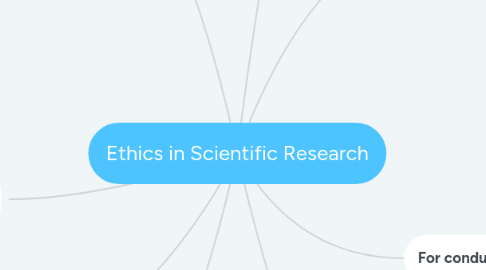
1. Science
1.1. What's Science
1.1.1. Objective
1.1.2. Subjective
1.2. A scientist's goals
1.2.1. Discovering truth or satisfy curiosity
1.2.2. Advancing knowledge
1.2.3. To live well and happy
1.3. Where can it be done
1.3.1. Universities
1.3.1.1. Goals
1.3.1.1.1. To advance knowledge
1.3.1.1.2. o advance knowledge
1.3.1.1.3. To serve the public
1.3.2. Industry labs
1.3.2.1. Goals
1.3.2.1.1. serve the company’s (or general ind
1.3.2.1.2. To increase opportunities in the global market
1.3.2.1.3. To compete & cooperate with other companies
1.3.3. Government labs
1.3.3.1. Goals
1.3.3.1.1. To serve national needs
1.3.3.1.2. To protect the nation’s people and property
1.3.3.1.3. To compete & cooperate with other nations
2. Bad science reasons
2.1. Poor research
2.2. Poorly designed experiments
2.3. misconduct by researchers
2.4. accidental or deliberate misinterpretation of data
3. Research Misconduct
3.1. Falsification
3.2. Fabrication
3.3. plagiarism
4. Avoiding Ethical Dilemmas in research
4.1. Know the rules
4.2. Know your rights and responsibilities
4.3. Learn to recognize the most common mistakes
4.4. Avoid conflicts in your research group
4.5. Learn from others' mistakes
5. Ethical Conflicts
5.1. Truth versus employer’s (funder’s) desired outcome
5.2. Truth versus employer’s (funder’s) desired outcome
5.3. Truth and openness versus secrecy
5.4. Conflicts of commitment
6. Research Ethics
6.1. Use of human subjects in research
6.1.1. Informed Consent
6.2. Use of animals in research
6.2.1. Appropriate use/care
6.3. Moral debates
6.4. Professional issues
6.4.1. Authorship
6.4.2. IP rights
6.4.3. confidentiality
7. For conducting science
7.1. What science should be conducted
7.1.1. What kind of science should we engage in?
7.1.2. Who should decide?
7.1.3. What ethical issues need to be considered, and how?
7.1.4. What ethical issues need to be considered, and how?
7.2. How science should be conducted?
7.2.1. Incorrect Answers will lead to
7.2.1.1. Negligence
7.2.1.2. Deliberate dishonesty
7.2.2. Mertonian norms
7.2.2.1. Universalism
7.2.2.2. Communalism
7.2.2.3. Disinterestedness
7.2.2.4. Organised Scepticism (Skepticism)
8. Scientific Paper Format
8.1. IMRAD
8.1.1. Introduction
8.1.2. Methods
8.1.3. Results and,
8.1.4. Discussion

